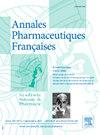加强突尼斯主要军事训练医院的抗生素处方实践:药物干预研究。
IF 1.1
Q4 PHARMACOLOGY & PHARMACY
引用次数: 0
摘要
背景:细菌感染在历史上一直是一个重大挑战,直到抗生素的发现才彻底改变了传染病的治疗。然而,随着时间的推移,细菌的适应机制导致了抗菌药耐药性的增加,因此有必要谨慎使用抗生素:本研究旨在全面分析与抗生素医嘱单上的抗生素处方相关的药物干预措施,以识别和纠正用药错误,优化抗生素处方实践:本研究获得了突尼斯突尼斯主军事训练医院机构审查委员会的批准。在突尼斯主要军事训练医院进行了为期 4 个月的回顾性研究。一名药房住院医师通过抗生素订购单对抗生素处方进行了药物验证。一旦发现错误,即采取药物干预措施,并通过机构软件查阅患者记录:在分析的 1100 份处方中,对 7 种抗生素进行了 41 次药物干预。所有干预措施中有 24% 与抗生素处方单有关,其中重症监护病房的错误数量最多。剂量不足和处方错误很常见:我们对抗生素医嘱单的药物干预对优化抗生素治疗至关重要。医疗团队的反馈机制对于提高处方质量和患者护理效果至关重要。要解决用药错误并加强抗菌药物管理,就必须持续开展监测和改进工作。本文章由计算机程序翻译,如有差异,请以英文原文为准。
Enhancing antibiotic prescribing practices at the main military training hospital of Tunis: A study of pharmaceutical interventions
Background
Bacterial infections have historically posed significant challenges until the discovery of antibiotics, which revolutionized infectious disease treatment. However, bacterial adaptation mechanisms over time have led to increased antimicrobial resistance, necessitating judicious antibiotic use.
Objectives
This study aims to comprehensively analyze pharmaceutical interventions related to antibiotic prescriptions governed by antibiotic order forms to identify and rectify medication errors, optimizing antibiotic prescribing practices.
Material and methods
Approval for this research was obtained from the institutional review board of the Main Military Training Hospital of Tunis, Tunisia. A retrospective study was conducted at the main military training hospital of Tunis over 4 months. Pharmaceutical validation of antibiotic prescriptions through antibiotic order forms was conducted by a pharmacy resident. Pharmaceutical interventions were initiated upon detection of errors, and patient records were accessed through institutional software.
Results
Out of 1100 prescription forms analyzed, 41 pharmaceutical interventions were conducted for 7 antibiotics. Twenty-four percent of all interventions were related to antibiotic order forms, with the intensive care unit accounting for the highest number of errors. Under-dosage and prescription errors were common.
Conclusion
Our pharmaceutical interventions related to antibiotic order forms are crucial for optimizing antibiotic therapy. Feedback mechanisms to healthcare teams are essential for enhancing prescription quality and patient care outcomes. Ongoing surveillance and improvement efforts are necessary to address medication errors and enhance antimicrobial stewardship.
Contexte
Les infections bactériennes ont toujours posé des défis importants jusqu’à la découverte des antibiotiques, qui ont révolutionné le traitement des maladies infectieuses. Cependant, les mécanismes d’adaptation des bactéries ont conduit à une résistance accrue, ce qui nécessite une utilisation judicieuse des antibiotiques.
Objectif
Cette étude vise à analyser de manière exhaustive les interventions pharmaceutiques liées aux prescriptions d’antibiotiques régies par les formulaires de prescription d’antibiotiques afin d’identifier et de rectifier les erreurs médicamenteuses et d’optimiser les pratiques de prescription d’antibiotiques.
Matériels et méthodes
Cette recherche a été approuvée par le comité d’éthique institutionnel de l’hôpital militaire principal de Tunis, Tunisie. Une étude rétrospective a été menée à l’hôpital militaire principal de Tunis pendant 4 mois. La validation pharmaceutique des prescriptions d’antibiotiques par les fiches de prescription d’antibiotiques a été effectuée par un résident en pharmacie. L’intervention pharmaceutique a été initiée dès la détection des erreurs médicamenteuse, et les dossiers des patients ont été consultés par le biais d’un logiciel institutionnel.
Résultats
Sur 1100 formulaires de prescription analysés, 41 interventions pharmaceutiques ont été réalisées pour 7 antibiotiques. Vingt-quatre pour cent de toutes les interventions concernaient les fiches de prescription d’antibiotiques, l’unité de soins intensifs étant à l’origine du plus grand nombre d’erreurs. Les erreurs de sous-dosage et de saisie de prescriptions étaient fréquentes.
Conclusion
Nos interventions pharmaceutiques liées aux fiches de prescription d’antibiotiques sont cruciales pour optimiser l’antibiothérapie. Les mécanismes de retour d’information vers les équipes de soins jouent un rôle crucial dans l’optimisation de la prescription des antibiotiques et, par conséquent, dans l’amélioration des résultats cliniques. Des efforts continus de surveillance et d’amélioration sont nécessaires pour lutter contre les erreurs médicamenteuses.
求助全文
通过发布文献求助,成功后即可免费获取论文全文。
去求助
来源期刊

Annales pharmaceutiques francaises
PHARMACOLOGY & PHARMACY-
CiteScore
1.70
自引率
7.70%
发文量
98
期刊介绍:
This journal proposes a scientific information validated and indexed to be informed about the last research works in all the domains interesting the pharmacy. The original works, general reviews, the focusing, the brief notes, subjected by the best academics and the professionals, propose a synthetic approach of the last progress accomplished in the concerned sectors. The thematic Sessions and the – life of the Academy – resume the communications which, presented in front of the national Academy of pharmacy, are in the heart of the current events.
 求助内容:
求助内容: 应助结果提醒方式:
应助结果提醒方式:


